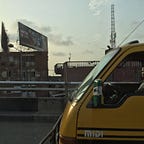After the Mani River is Norrow Town. One might not notice the shy community clothed by the giant palm trees, hidden behind the proud fronds, sheltered from the world. Long ago, when years were days and oceans were tiny droplets, seven women and their households pitched their tents at the riverbank in search of shelter. Each woman walked a hundred steps to the left, a hundred steps to the right, drew a circle in the red sand connecting these points, and called it ‘home’. Norrow was not always Norrow. It was once ‘No One Knows Tomorrow’. A boy would ask his father, “Shall we lay our head to rest now, Baba?” “Not for long, my son. No one knows tomorrow.” A man would ask his wife, “Shall I cook all of the yams, my love?” And she would say, “Only a tuber, my husband, no one knows tomorrow.” Those who visited the town began to call them ‘No-tomorrow’ people, but the quick minds of the youths slurred the words to ‘Norrow’. The sun-baked mud huts stood in a semi-circle like they were having a meeting. The red and green of tomatoes and peppers, preferred over yams for their quick maturity, decorated the brown riverbank. Three big huts stood proudly in the center of the town: a school where children came to learn, a birthing hut, and a roofless prayer ground. The town people praised before the rising of the sun and worshipped after the ascent of the moon. The heart of the town was the Mani River. The robust fishes with bulging eyes and iridescent scales fed the town. The river breathed on the town, cool air flowing through the huts, gently fanning the settlers to sleep every day. The first settlers died, one by one until only Amma remained. She blessed the lands, the river, and the people, and breathed her last. The community gathered by the riverbank as the last of the first laid on a bed of fronds. They sang songs and pushed her from the red earth into the calming river as they had done with their other ancestors. The river rocked sweet Amma as one would do with a baby, and the people knew that ‘tomorrow’ would meet them there.
